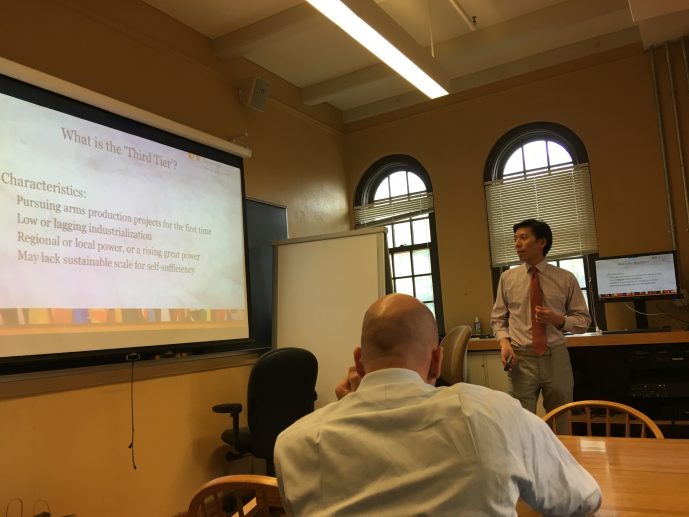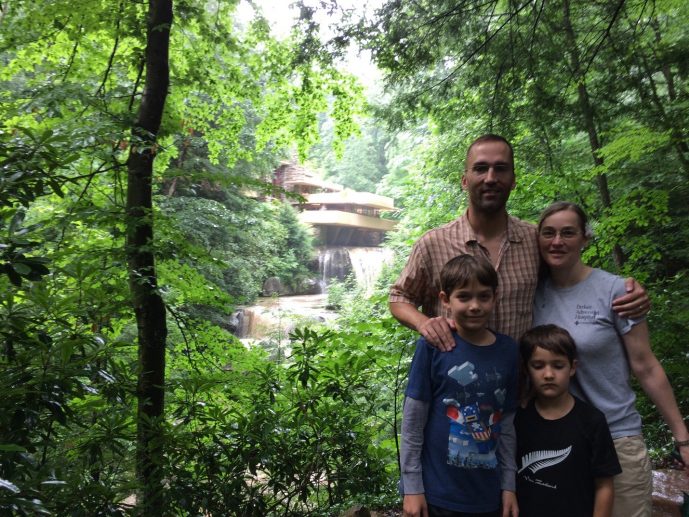Gary’s spring wrap-up
Last week, we heard from Mariya and Adi, two of our newly graduated Student Stories writers. This week, I’m turning back to our continuing bloggers for their end-of-spring reflections. Today, Gary reports on his first year in Fletcher’s PhD program. He will complete his coursework in the fall semester and move on to his comprehensive exams and dissertation.
As the spring semester came to a close, I paused to reflect back on my first year of doctoral studies and attempted to put it into context. Remarkably, it is the fourth year of full-time study I’ve enjoyed since the completion of my bachelor’s degree in 2004 (all while serving on active duty in the Marine Corps). I was previously fortunate to spend three consecutive years as an Olmsted Scholar (one year of language training in California, while simultaneously working on an associate’s degree in Mandarin Chinese, followed by two years in a master’s program in Taiwan). As a military officer, it is unusual to have the opportunity to follow those years of school with additional graduate studies. In that regard, I’ve benefited from the recent emphasis that my service has placed on developing officers with doctorates, paving the way for what I am doing now. I’ve been deeply impressed with the quality of the first year of my education at Fletcher, and I am very happy that I will have another year here to continue my work. Following a vote in May by the PhD Committee, I have now advanced to PhD candidacy.
 An aspect of the program that I have appreciated is Fletcher’s PhD colloquium, a forum for doctoral students and candidates to present their research to their peers and faculty members and receive feedback and (constructive) criticism before making their actual dissertation proposal defense or conference presentation. Some students also use the colloquium at a later stage in their dissertation research and writing process, presenting at the colloquium only a short time before they plan to defend their dissertation in front of their committee, almost like a “dry run.” For example, at a colloquium session in late January 2018, we heard David Wallsh, currently a Research Analyst with the Center for Naval Analyses, present his dissertation research, entitled “Switching Sides: Foreign Policy Realignment in Egypt and Syria.” Wallsh integrated the feedback he received at that colloquium session and then successfully defended his dissertation in April. He graduated from Fletcher at Commencement last month.
An aspect of the program that I have appreciated is Fletcher’s PhD colloquium, a forum for doctoral students and candidates to present their research to their peers and faculty members and receive feedback and (constructive) criticism before making their actual dissertation proposal defense or conference presentation. Some students also use the colloquium at a later stage in their dissertation research and writing process, presenting at the colloquium only a short time before they plan to defend their dissertation in front of their committee, almost like a “dry run.” For example, at a colloquium session in late January 2018, we heard David Wallsh, currently a Research Analyst with the Center for Naval Analyses, present his dissertation research, entitled “Switching Sides: Foreign Policy Realignment in Egypt and Syria.” Wallsh integrated the feedback he received at that colloquium session and then successfully defended his dissertation in April. He graduated from Fletcher at Commencement last month.
Over my two semesters at Fletcher, a total of a dozen of these sessions have taken place about every couple weeks. Since Fletcher PhD candidates have wide-ranging research interests, we get to enjoy presentations that run the gamut of topics. For example, last fall, PhD candidate Fang Zhang gave a presentation entitled, “How Governments Mobilize Finance to Support Innovation: The Case of the Domestic Clean Energy Sector,” which she later presented in a revised form at a China Global Research Colloquium at Boston University. Ben Naimark-Rowse presented on communication across enemy lines; Jamilah Welch presented on her research into the adoption of new agricultural technologies in Niger, centered on Purdue Improved Crop Storage (PICS) bags; and this past March, Andrea Walther-Puri presented on “Assessing the Impact of U.S. Military Counterterrorism Assistance.”
In addition to being a venue for presenting research, the colloquium also periodically serves as a forum for mentorship by the more senior PhD candidates. For example, a panel of students has spoken about what to expect and how to prepare for comprehensive exams, which come after completion of the coursework phase. We’ve also enjoyed a panel featuring senior PhD candidates who have attended the Institute for Qualitative and Multi-Method Research at Syracuse University, which we are all encouraged to attend after completion of the second year in the program. Finally, we’ve also included students and faculty from the new joint Tufts-Fletcher PhD in Economics, and Public Policy program, inviting them to join the colloquiums and other social events put on by the Fletcher PhD program.
Looking ahead for me, one additional semester of coursework remains. Last summer before matriculating at Fletcher, I attended the Public Policy and Nuclear Threats workshop run by the Institute on Global Conflict and Cooperation at University of California-San Diego, which was an excellent venue for recalibrating my mind for the academic challenges and opportunities that doctoral studies experience, and for networking with students, professors, and policymakers in the nuclear realm. This summer, I’ll likely get started on developing and working through the reading lists for my concentration areas, International Security Studies and Pacific Asia, in preparation for the comprehensive exams that I plan to take in the spring of 2019. During May and June I’ve attended or will attend some interesting conferences in Washington, DC and Philadelphia. Later in the summer, I’ll attend the Aspen Security Forum and a seminar in history and statecraft for PhD students at the Clements Center for National Security at the University of Texas at Austin. I’m happy that the Clements Center seminar will provide another rich learning and networking environment to keep me invigorated between semesters. Around those events, I’ll do some road-tripping with my family, spanning much of the continental United States, continuing to enjoy being back in our home country after several years assigned overseas.
Last summer, as my family drove across the country moving to the Boston area to start at Fletcher, we made a couple of stops. One of them was at Fallingwater, arguably American architect Frank Lloyd Wright’s most famous work, located in western Pennsylvania not far from Pittsburgh. I’d long wanted to see that work in person, at least since high school (which for me was the early 1990s), so it was a big deal to me to finally see it. As an architecture aficionado, I hope to stake out a few more American classics on my wanderings this summer.
